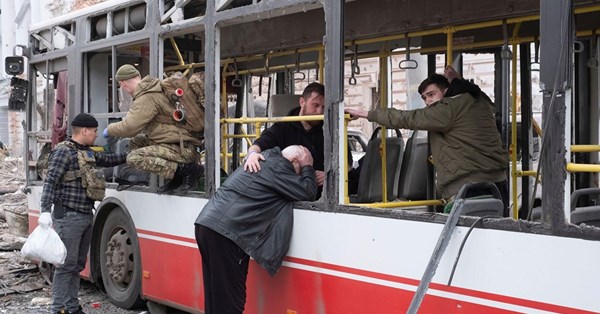CHURCHES in Ukraine and abroad have condemned the latest Russian attack on Ukrainian civilians, which left at least 35 dead and more than 100 injured, during Palm Sunday services in the north-eastern city of Sumy.
“At the beginning of the Holy Week of Easter, the celebration of Palm Sunday was transformed into a day of lamentation by yet another Russian missile attack,” the general secretary of the World Council of Churches (WCC), the Revd Professor Jerry Pillay, said.
“Human brutality and wickedness do not rest but continue to claim innocent victims. The WCC again demands that those responsible for such reprehensible attacks stop shedding innocent blood in pursuit of their territorial and political ambitions. We appeal to the international community to protect the victims from such aggression and to hold the perpetrators accountable by all available means.”
The statement was issued in response to Sunday’s missile strike — the deadliest so far this year — on Sumy, 15 miles from the Russian border.
The Ukrainian Council of Churches and Religious Organisations, which unites Ukraine’s rival Orthodox Churches, as well as Roman Catholics, Protestants, Jews and Muslims, said that Russian terrorist attacks were taking place during a rare common celebration of Easter by all Churches, and that its members would “beseech the Almighty for just retribution against the perpetrators”.
“Despite the festive period associated with the Jewish Passover and Christian Easter, the Russian state continues to terrorise Ukrainian cities and villages day and night,” the Council said. “Such actions demonstrate that nothing is sacred for the state that declares itself to be ‘Holy Rus’. Basic respect for the value of human life is absent, not to mention respect for the holidays of Christianity and Judaism.”
Two ballistic missiles, one exploding mid-air, struck central Sumy as Christians were marking Palm Sunday, in what was widely seen as the prelude to a new Russian offensive.
The attack was defended by the Kremlin’s spokesman, Dmitry Peskov, who said that it had targeted a meeting of Ukrainian military officers.
It was deplored, however, by the European Union, and many heads of state and government, including Sir Keir Starmer, while the UN secretary-general, António Guterres, warned on X that attacks against civilians were prohibited under international law.
Ukraine’s Moscow-linked Orthodox Church said that the brother of Archbishop Serhiy (Anitsoy) of Tulchyn-Bratslav had been killed in the attack, which damaged the Holy Transfiguration Cathedral, and that Metropolitan Evlogii (Gutchenko) of Sumy-Akhtyrka had condemned it as “yet another godless crime by the Russian military”.
The Vatican Nuncio in Kyiv, Archbishop Visvaldas Kulbokas, told Vatican Radio that civilians had been targeted “at the very moment they were going to pray”, while the Primate of the Ukrainian Greek Catholic Church, Major Archbishop Sviatoslav Shevchuk, warned that Moscow was “intensifying its attacks”.
“As we celebrate the holiday of life, the enemy seeks to impose his holiday of death on us,” he said in a national message on Sunday. “We hope everyone will understand that Ukraine is the innocent victim of this aggression, and that truth and peace mean protecting the innocent victim and restraining the murderous hand of the Russian aggressor.”
The attack was carried out as funerals continued for 20 civilians, half of them children, killed in a similar ballistic missile strike on President Zelensky’s home town of Kryvyi Rih on 4 April (News, 11 April), and as Ukrainian civilians were warned to avoid crowded areas over Easter
In a report earlier this month, the United Nations warned that civilian casualties in the three-year war had increased by half during March, despite Ukraine’s agreement to a US-brokered ceasefire.
In a CBS News interview this week, President Zelensky urged President Trump to visit Ukraine and “see the people, civilians, soldiers, hospitals, churches, children who have been destroyed or killed”, before “making any decisions, any plans for negotiations”.
Speaking on Monday, however, President Trump questioned President Zelensky’s competence, and said that he was unwise to “start a war” against “somebody 20 times” larger.
In a post on social media, Bishop Vitaliy Kryvytskyi, who chairs the Roman Catholic Church’s church-state commission, said that “some politicians” had “already forgotten the axiom: you can’t negotiate with terrorists. . . Some would be willing to resume frozen business with them, while others would gladly take the place of those who’ve severed relations with a criminal state.
“The most important thing in their lives is a ‘deal’ — an agreement without justice and morality, and enrichment with money soaked in hatred and blood. God will be their judge, as bloody dictators and their accomplices find a shameful place in future history textbooks.”

















